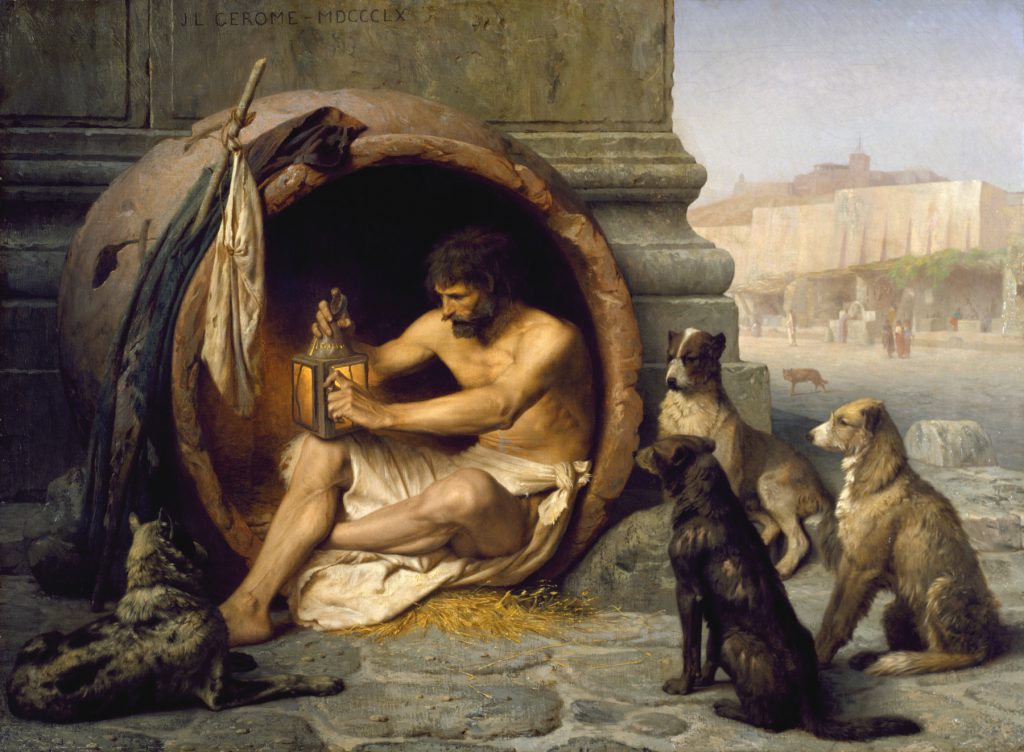October 10, 2016, by Will Leveritt
“If … you’re a citizen of the world, you’re a citizen of nowhere”
Text by Oliver Thomas
‘If you believe you’re a citizen of the world, you’re a citizen of nowhere. You don’t understand what the very word “citizenship” means’, pronounced Theresa May during the Conservative Party conference last week, addressing rich people who allegedly align themselves with an ‘international elite’ rather than being committed to ‘our society’.
The idea of being a ‘citizen of the world’ has long been a cliché in English, and was bequeathed to us principally through Cicero and Plutarch, who both record that Socrates claimed to be one (Tusc. 5.108, Exil. 600f). The phrase crops up over 100 times in English writing between 1580 and 1700, according to a very quick search on EEBO.

Diogenes in his Tub. Jean-Léon Gérôme, 1860. The philosopher sits serenely, attended by faithful dogs; the sources refer to some more outré behaviour.
Classicists tend to regard the anecdote about Socrates as derivative from one about a man viewed in antiquity as Socrates’ philosophical grandson, Diogenes of Sinope. He came to Athens in the fourth century BCE, and spent his days provoking the Athenians in ways which led to a particularly rich tradition of stories – many no doubt embellished in the retelling. He lived in a barrel, masturbated in the market-place… and declared himself to be a ‘kosmopolites’ (Diogenes Laertius 6.63).
The word ‘cosmopolitan’ has become familiar, but in Greece it was an oxymoron, typical of Diogenes’ provocative style. ‘-politan’ refers to the ‘polis’, one of the thousand or so towns which defined the citizenship of Greeks in a much more local way than we are used to. By juxtaposing this with ‘cosmo-’, Diogenes replaced the Greek norm of citizenship of one town with a sense of belonging not just to ‘Greece’, ‘humankind’ or ‘the Earth’, but to the whole cosmos. This is of a piece with Diogenes’ famous sense of commonality with animals: he was the original ‘cynic’ because he admitted to ‘dog-like’ behaviour. And since the Greek word kósmos, as well as referring to the universe, refers to other instances of elaborately ordered wholes including the government of single poleis, the choice of word makes this slide from literal citizenship to more extended loyalties seem natural.
Different philosophers fleshed out this sense of commonality with others in different ways. Diogenes probably connected it to his ideal of living in accordance with ‘nature’, of which everything is a part. One would hardly expect a prime minister to endorse the ways in which Diogenes pursued that ideal, by flouting as artificial the obligations and prohibitions imposed by Athens’ civic organisation.
Soon after, however, Zeno of Citium also viewed all human beings as ‘fellow-citizens’ (Plutarch Fort. Al. 329a), and founded the Stoic tradition of cosmopolitanism, which placed more weight on the divine ordering of all society. Later in antiquity, Pseudo-Heraclitus presented this thought starkly: if you are a good citizen of one polis, you will be a ‘citizen of the world’ because you will also obey the unwritten divine laws which govern it (Epistle 9.2).
In declaring that the ideal of being a citizen of the world amounts to a misunderstanding of the word ‘citizenship’, Theresa May tried to make the oxymoronic seem moronic. In context, her comment applied explicitly only to a small group of the wealthy for whom, she suggested, cosmopolitan identity replaces commitment to a particular nation or community. However, the general form of the soundbite means that, as she could have predicted, it has also been widely quoted out of context as an instance of the current stirring of suspicion towards feelings of loyalties to Europe.
One of the things we share with Europe is the classical tradition, which gives us the word ‘cosmopolitan’ and a range of ways of conceptualising cosmopolitanism, which should not be thrown out with the bathwater in the prime minister’s comment.
No comments yet, fill out a comment to be the first

Leave a Reply